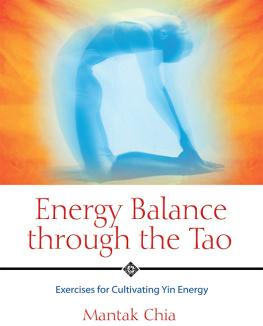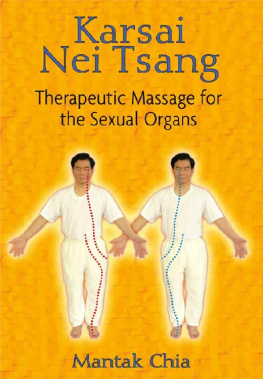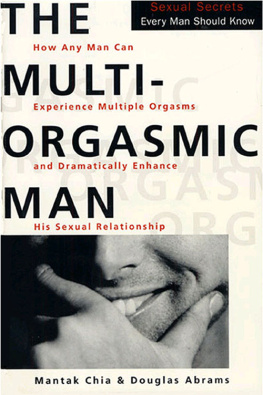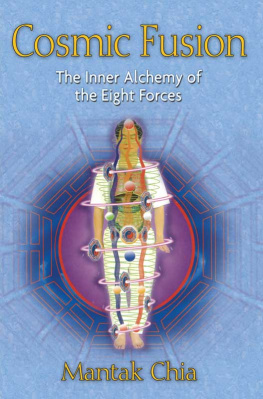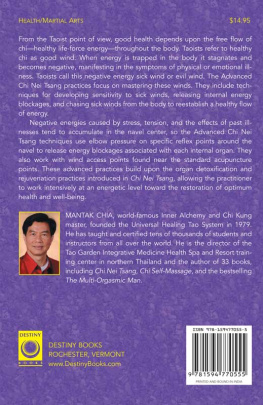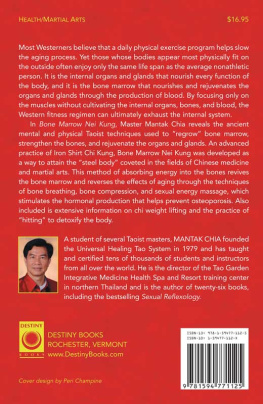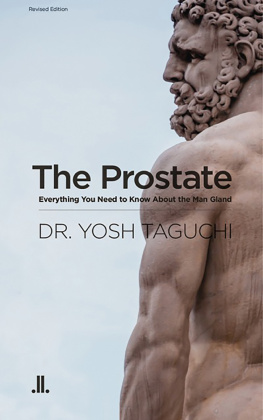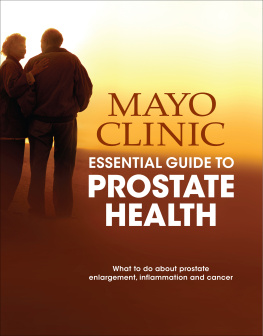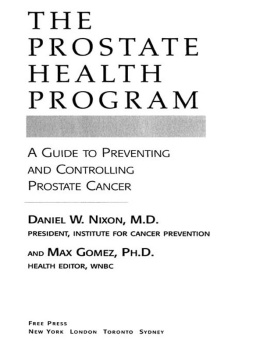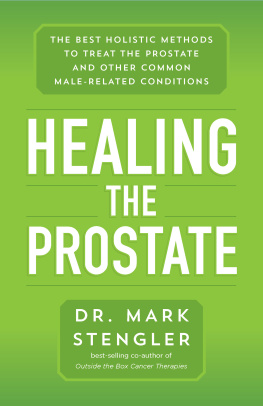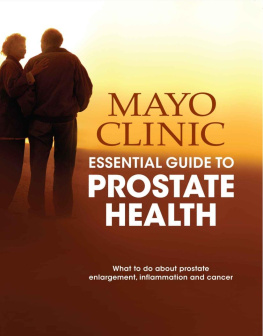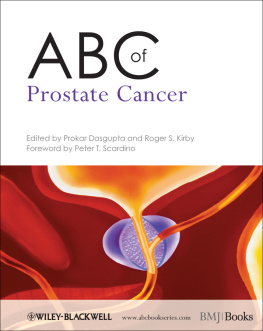
Acknowledgments
The Universal Tao Publications staff involved in the preparation and production of Chi Kung for Prostate Health and Sexual Vigor extend our gratitude to the many generations of Taoist masters who have passed on their special lineage, in the form of an unbroken oral transmission, over thousands of years. We thank Taoist Master I Yun (Yi Eng) for his openness in transmitting the formulas of Taoist Inner Alchemy.
We offer our eternal gratitude to our parents and teachers for their many gifts to us. Remembering them brings joy and satisfaction to our continued efforts in presenting the Universal Healing Tao system. As always, their contribution has been crucial in presenting the concepts and techniques of the Universal Healing Tao.
We wish to thank the thousands of unknown men and women of the Chinese healing arts who developed many of the methods and ideas presented in this book. We offer our gratitude to Bob Zuraw for sharing his kindness, healing techniques, and Taoist understandings.
We thank the many contributors essential to this books final form: the editorial and production staff at Inner Traditions/Destiny Books for their efforts to clarify the text and produce a handsome new edition of the book and Nancy Yeilding for her line edit of the new edition.
We also wish to thank Colin Drown and Jean Chilton for their editorial work on the earlier edition of this book.
A special thanks goes to our Thai production team: Hirunyathorn Punsan, Saysunee Yongyod, Udon Jandee, and Saniem Chaisam.
Putting Prostate Chi Kung into Practice
The practices described in this book have been used successfully for thousands of years by Taoists trained by personal instruction. Readers should not undertake the practice without receiving personal transmission and training from a certified instructor of the Universal Healing Tao, since certain of these practices, if done improperly, may cause injury or result in health problems. This book is intended to supplement individual training by the Universal Healing Tao and to serve as a reference guide for these practices. Anyone who undertakes these practices on the basis of this book alone, does so entirely at his or her own risk.
The meditations, practices, and techniques described herein are not intended to be used as an alternative or substitute for professional medical treatment and care. If any readers are suffering from illnesses based on mental or emotional disorders, an appropriate professional health care practitioner or therapist should be consulted. Such problems should be corrected before you start training.
Neither the Universal Healing Tao nor its staff and instructors can be responsible for the consequences of any practice or misuse of the information contained in this book. If the reader undertakes any exercise without strictly following the instructions, notes, and warnings, theresponsibility must lie solely with the reader.
This book does not attempt to give any medical diagnosis, treatment,prescription, or remedial recommendation in relation to anyhuman disease, ailment, suffering, or physical condition whatsoever.
Introduction
After more than fifty years of sharing Prostate Chi Kung daily practice through the Universal Healing Tao system, we find it hard to believe that 70 percent of men over the age of sixty suffer from prostate gland malfunctioning or prostate gland cancer, which can lead ultimately to death. The simple techniques of Prostate Chi Kung enable every man to literally get in touch with his urogenital area and eliminate such problems and discomforts by simply touching himself with the proper intentions. At the suggestion of Ehud Sperling, the publisher of Inner Traditions/Destiny Books, we have gathered together in this book a series of Universal Healing Tao techniques and daily exercises that will support prostate health and sexual vigor. Debilitating urogenital decline is not inevitable for older men. With this simple daily practice, the prostate and urogenital system can function well into advanced old age.
Cancer is the uncontrolled growth of abnormal cells, which feed off the body to maintain this growth. When a cell is damaged or altered without repair to its system, it usually dies. However, cancer cells, also termed malignant cells or tumor cells, proliferate and a mass of cancer cells develops. Many cancers and the abnormal cells that compose the cancer tissue are further identified by the name of the tissue that the cells originate from, such as lung cancer, prostate cancer, or colon cancer. Cancer of the prostate gland, an organ in the male reproductive system, is the most common malignancy in American men and the second leading cause of deaths from cancer, after lung cancer.
The prostate gland is located at the base or outlet (neck) of the urinarybladder. The gland surrounds the first part of the urethra, thepassage through which urine drains from the bladder to exit from thepenis. One function of the prostate gland is to help control urination bypressing directly against the part of the urethra that it surrounds. The primaryfunction of the prostate gland is to produce some of the substancesthat are found in normal semen, the fluid that transports the sperm toassist with reproduction.
In a young man, the normal prostate gland is the size of a walnut.During normal aging, however, the gland usually grows larger. Thishormone-related enlargement with aging is called benign prostatic hyperplasia(BPH), a condition that is not associated with prostate cancer.However, both BPH and prostate cancer can cause similar problems inolder men. An enlarged prostate gland can squeeze or impinge on theoutlet of the bladder or the urethra, leading to difficulty with urination.The resulting symptoms commonly include slowing of the urinary streamand urinating more frequently, particularly at night. In addition to causingdifficulty with urination, prostate cancer may cause pain, problemsduring sexual intercourse, or erectile dysfunction.
Prostate cancer tends to develop in men over the age of fifty. Althoughit is one of the most prevalent types of cancer in men, many never havesymptoms, undergo no therapy, and eventually die of other causes, suchas heart or circulatory disease, pneumonia, other unconnected cancers,or old age. This is because cancer of the prostate is, in most cases, slowgrowing and symptom free. However, there are cases of aggressive prostatecancers, in which cancer cells break away from the original mass, travelthrough the blood and lymph systems, and lodge in other areas, particularlythe bones and lymph nodes, where they repeat the uncontrolledgrowth cycle. This is termed metastatic prostate gland cancer. Abouttwo-thirds of cases are slow growing, the other third more aggressive andfast developing.
According to the American Cancer Society, the estimated lifetimerisk of being diagnosed with prostate cancer is 17.6 percent for Caucasiansand 20.6 percent for African Americans, and the lifetime risk of death is2.8 percent and 4.7 percent respectively. As reflected by these numbers, prostate cancer is likely to impact the lives of a significant proportion ofmen alive today. Over the years, however, the death rate from this diseasehas shown a steady decline because of early detection, and currentlymore than 2 million men in the United States are still alive after beingdiagnosed with prostate cancer at some point in their lives. The age andunderlying health of the man, the extent of metastasis, and the response ofthe cancer to initial treatment are important in determining the outcomeof the disease.
Cancer can potentially be caused by anything that influences a normalbody cell to develop abnormally, such as stagnant energy flow, energyblockage, or improper diet. Some cancer causes remain unknown, whileother cancers may develop from more than one known cause. Some mayalso be developmentally influenced by a persons genetic makeup. Manymen develop prostate cancer due to a combination of these factors.
Next page

